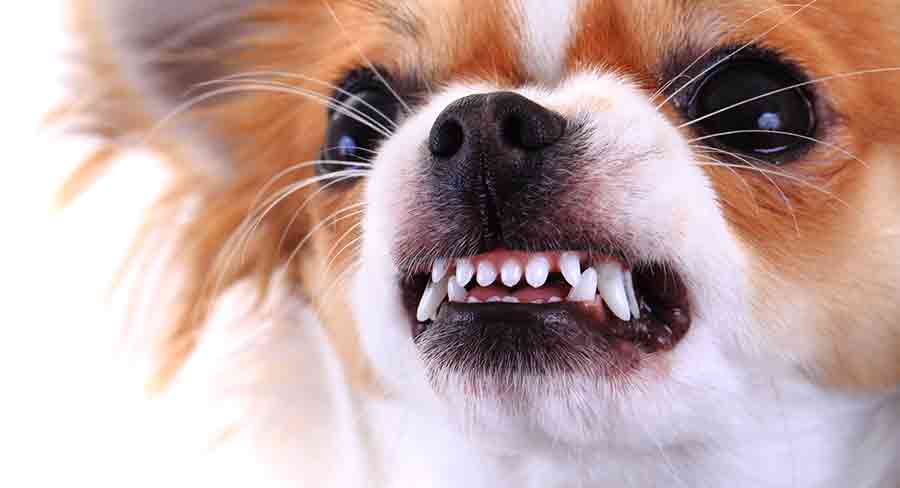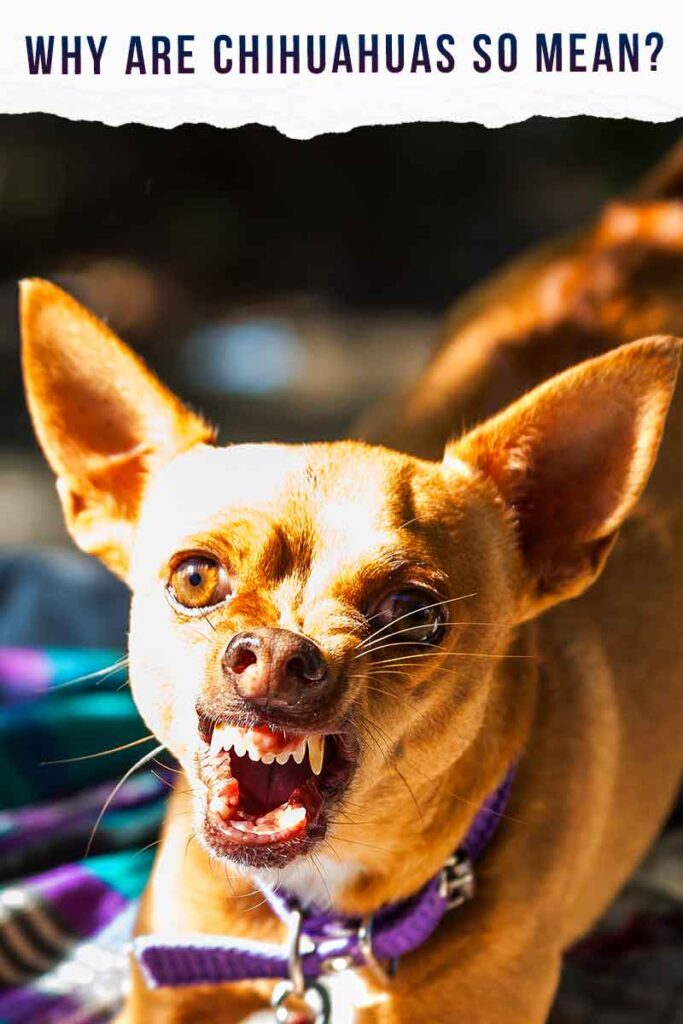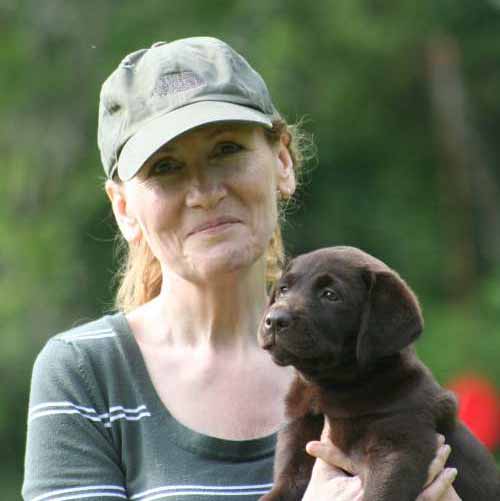
Why are Chihuahuas so mean? Despite their small size and purpose as a companion and lap dog, Chihuahuas are known for being aggressive, protective, and downright mean! But is this just a part of the breed? Or is there something owners can do to minimise these unwanted traits?
The answer is usually a bit of both. Chihuahuas fall into the toy breed category, meaning they are smaller and more fragile than larger breeds. So, they are more easily hurt, which can lead to defensive and fear-based aggression. But, this small size equally often means owners don’t see the need to train or socialize their Chis. Let’s take a closer look at these factors, to get a more detailed answer to the question: why are Chihuahuas so mean?
Why Are Chihuahuas So Mean?
Many potential owners hope to bring home a happy, friendly and affectionate dog when they choose a Chihuahua. A personality to match that small, cute appearance. But, the Chihuahua breed, despite its tiny size, has a huge, feisty personality. In fact, many call them big dogs in a little dog’s body! And an unhappy Chihuahua is known to direct that fury towards anyone and everyone. From its owners, to strangers, to other dogs. So, why are Chihuahuas so mean?
There are a number of factors that can lead to Chihuahua aggression. The causes for one Chihuahua may be very different to those for another. So, it’s important owners learn to recognize the context around aggressive outbursts in their Chihuahua, to help reduce the behavior. Here are some of the most common causes of Chihuahua aggression.
Lack of Socialization
This factor isn’t just limited to Chihuahuas. In fact, any dog that isn’t properly socialized will be more likely to display fear-based aggression towards unknown things, people, and animals.
From around 8 weeks to around 16 weeks, puppies have a fear period. Positive and negative experiences at this stage will really stick with your dog! So, if you introduce them to lots of new things and people, paired with pleasant treats and happy feelings, your dog will grow to be happy and confident around those things in the future. But, if you don’t give your dog these experiences, or if your dog has very negative experiences in this period, they are more likely to be scared and reactive to new situations in the future.
So, a well socialized Chihuahua is more likely to be happy, confident, and friendly towards strangers and other animals. But, a poorly socialized one may react with fear-based aggression – which can often come across as them just being mean and grumpy. A Chihuahua older than 16 weeks can be socialized, but it will be a much longer process that will require patience.
Fragile Bodies Due to Small Size
Since Chihuahuas are such small dogs, they have more fragile bones than larger breeds. This means they are more breakable and more prone to injuries. So, a Chihuahua could easily hurt themselves by falling off the couch, or even during play sessions with you, other animals, and young children. Injuries can lead to aggression and defensive behaviors by a Chihuahua.
Injuries will always be painful, no matter what your dog’s breed. But, one study found that owners and veterinarians believed the Chihuahua breed to have a very high sensitivity to pain. So, if your Chihuahua has suddenly become aggressive, it could be due to an injury. This is a major reason why Chihuahuas won’t always suit homes with children who are too young to learn how to properly handle and play with a toy dog.

Lack of Training
Since Chihuahuas are so small, many owners don’t see the need for obedience training. After all, it won’t hurt anyone if it jumps up and it won’t hurt your arm when it pulls on the leash. Unfortunately, a lack of training can lead to many issues further down the line. So, Chihuahua owners should train their dog from the time they bring them home, just as they would with a larger dog breed. This can help to reduce problematic and mean behavior, as it will also offer your Chi some exercise and much-needed mental stimulation.
Poorly Bred Chihuahuas
Breeding is another element that can impact a dog’s behavior. Over generations, dog owners have bred certain traits into their favorite breeds. It’s why Chihuahuas are so small! Their tiny size was seen as cute, so breeders chose to exaggerate it over generations until we had the Chis we see today. But, breeding for appearance alone can lead to health problems and poor temperaments. Especially if breeders choose two unhealthy dogs, or particularly aggressive dogs as parents.
This can also stem from a breed’s popularity. The more popular a dog breed is, the more disreputable breeders (backyard breeders and puppy mills) will jump on the trend to make some money. And, these places will rarely breed for healthy, friendly dogs. They will just churn out as many puppies as possible to increase their profits. Avoiding these places and choosing a reputable breeder is a great way to increase your chance of bringing home a friendly, happy Chihuahua.
Negative Experiences from Earlier Owners
Not all owners choose to get their dogs from breeders. Rescue dogs are becoming more popular, especially with the growing number of dogs in need. But, many Chihuahuas found in rescue centers are a little older and have already had at least one owner. Some owners may have given up Chihuahuas for mean or aggressive behavior, but others may be there for different reasons.
There’s no guarantee that a rescue Chihuahua will be aggressive. But, a rescue Chihuahua will have early experiences that you might not know. Their previous owner may not have socialized or trained them. Some rescue Chihuahuas may have even been abused. In these cases, the triggers for their aggression can be unpredictable and varied. So, make sure you’re patient with an aggressive or fearful rescue Chihuahua.
Fear Based Aggression
We mentioned this type of aggression a little bit in the earlier section on socialization. But, it can be an important one to look at in closer detail. There are a number of things that can scare Chihuahuas – from large animals, to rough children, to loud noises. And, one study suggests that fear can increase with age in all dogs. So, if you know there are certain things that trigger fear in your Chihuahua, be aware of a potential fearful, aggressive response around them. Try to minimise exposure to the trigger in order to minimise the fear-based behavior.
Are Chihuahuas Protective?
One reason Chihuahuas are so mean is because they are very protective dogs. They form very strong bonds with their owners. This can lead to stranger-directed aggression, and possessive aggression when their owner’s attention is given to other dogs or other members of the household. Chihuahuas may also become protective over their own things, like certain toys, bedding, or food.
If you have young children at home, it’s important to teach them about a dog’s body language. This will help to avoid any incidents where a Chihuahua is guarding things, and a child misunderstands those signals. If your Chihuahua’s protectiveness is leading to aggression, it’s a good idea to speak to your veterinarian, or work with a behaviorist.
Are All Chihuahuas Aggressive?
It’s not guaranteed that every Chihuahua will be aggressive or mean. When raised well, bred well, and treated with care, many Chihuahuas will grow to be friendly, affectionate dogs. They may never be as warm to strangers as the Labrador. But they can be much different to the stereotypical evil Chihuahua!
To encourage a friendly temperament in your Chi puppy, choose a reputable breeder. This won’t just mean one that breeds from the healthiest dogs, but also those with the best temperament. Make sure you meet the mother dog and note how she reacts to you. Is she friendly or more wary? Once you choose your puppy and bring them home, get started on socialization. And when training them, use positive reinforcement methods. These will build on the strong bond between you, and are better than outdated aversive methods, which can actually increase unwanted behaviors and aggression.
The Typical Chihuahua Personality
Chihuahuas are usually very close-knit with their family. With their favorite members, they will be affectionate, and keen to spend as much time as possible. However, they are also known to be quite independent little dogs. You may encounter this stubborn streak during training! Which is why positive reinforcement methods can work so well, building on your bond rather than challenging that stubborn streak.
Chihuahuas are often quite reserved toward strangers, even when socialized well. They are also prone to barking, and very protective. But, they will also be playful in their homes, and will enjoy the mental stimulation that comes with interactive toys and training. Chihuahuas may be aggressive from fearful reactions to things, as well as reasons relating to their size. So it’s important to make sure your home and lifestyle is suited to this small dog before bringing them home.
How to Stop My Chihuahua From Being Aggressive
The best way to minimise aggression in a new Chihuahua puppy is to socialize them well to new experiences before 16 weeks of age. But, this isn’t always possible. For instance, if you have an older rescue dog, or didn’t know about the importance of socialization until after this age. Luckily, there are still things you can do to decrease the risk of aggression in your Chihuahua.
Make sure they are getting enough mental stimulation, and that they have no injuries. Sudden cases of aggression can be a sign of injuries or illness, which are particularly common in these fragile toy dogs. If there are things that you know tend to trigger aggression or fear in your Chihuahua, do your best to avoid or minimise exposure to these. For instance, walk your Chi away from the dog park if they are scared of other dogs.
And finally, make sure that everyone who interacts with your Chihuahua is gentle, and knows the signs that your Chi needs some space. All dogs, including Chihuahuas, will show they are unhappy through their body language before being aggressive. So, teach young children and everyone else the signs, including a stiff body, whale eye, exposed teeth, growling, and more.
Why Are Chihuahuas So Mean? A Summary
Chihuahuas have a reputation for their sassy, feisty personalities. But, not all Chihuahuas are mean! If you take the time to research your breeder and socialize your puppy well when you bring them home, you’ll reduce the risk of aggression in your Chihuahua. And, make sure to teach your family and guests exactly how to interact with your dog, since they are a much more fragile breed than others.
If you’ve noticed a sudden onset of aggression in your Chihuahua, it’s worth taking them to the vet to see if there is anything wrong with their health. Have you noticed mean behavior from your Chihuahua? We would love to hear about your dogs in the comments!
Readers Also Liked
- How To Potty Train A Chihuahua – Your Chihuahua Potty Training Guide
- Shih Tzu Chihuahua Mix – Is This A Good Family Dog?
- Chiweenie – Getting To Know The Chihuahua Dachshund Mix
- Why Are Chihuahuas So Small?
References and Resources
- Howell, T. (et al), ‘Puppy Parties and Beyond: The Role of Early Age Socialization Practices on Adult Dog Behavior’, Veterinary Medicine: Research and Reports (2015)
- Gruen, M. (et al), ‘Do Dog Breeds Differ in Pain Sensitivity? Veterinarians and the Public Believe They Do’, Plos One (2020)
- Storengen, L. & Lingaas, F. ‘Noise Sensitivity in 17 Dog Breeds: Prevalence, Breed Risk and Correlation with Fear in Other Situations’, Applied Animal Behavior Science (2015)
- Tonoike, A. (et al), ‘Comparison of Owner-Reported Behavioral Characteristics Among Genetically Clustered Breeds of Dog (Canis Familiaris)’, Scientific Reports (2016)
- Farrell, L. (et al), ‘The Challenges of Pedigree Dog Health: Approaches to Combating Inherited Disease’, Canine Medicine and Genetics (2015)
- Duffy, D. (et al), ‘Breed Differences in Canine Genetics’, Applied Animal Behavior Science (2008)
- McGreevy, P. (et al), ‘Dog Behavior Co-Varies with Height, Bodyweight and Skull Shape’, Plos One (2013)
- Vieira de Castro (et al), ‘Improving Dog Training Methods: Efficacy and Efficiency of Reward and Mixed Training Methods’, Plos One (2021)
- Ellis, J. (et al), ‘Cranial Dimensions and Forces of Biting in the Domestic Dog’, Journal of Anatomy (2009)
- O’Neill, D. (et al), ‘Demography and Commonly Recorded Clinical Conditions of Chihuahuas Under Primary Veterinary Care in the UK in 2016’, BMC Veterinary Research (2020)

Free Training Tips
Get Pippa's free dog training tips delivered to your inbox

 Puppy Agility Training
Puppy Agility Training
My Chihuahua seams to be more aggressive after she eats. She bites and growls. She is only 9 weeks and 1 day we got her at 6 weeks. I love her but she is very aggressive after eating, and her teeth are sharp!!